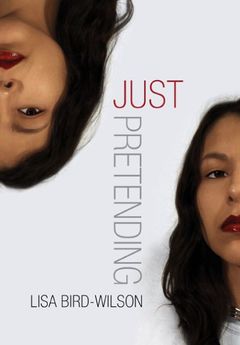Lisa Bird-Wilson's Just PretendingReviewed by Amy Mitchell
|

Generally speaking, one does not review a book that is already four years old. However, I believe that there should be exceptions for books that have not received their fair share of attention, and Just Pretending by Lisa Bird-Wilson (published by Coteau Books) is an excellent example. I randomly picked up this collection of short stories a few months ago, mostly because it was obviously made with care (I am a sucker for fine printed objects) and the cover looked interesting. I had no idea who Lisa Bird-Wilson is. By the time I was a few stories into the collection, I realized that I most definitely should have known who Lisa Bird-Wilson is, because this collection is simply that good. That I didn’t suggests some uncomfortable truths about the literary scene in this country (especially considering the collection’s positive reviews by Prism and The Winnipeg Review, as well as the Saskatchewan Book Awards it has won).
If I had to place a bet on why Just Pretending has been largely overlooked, my money would be on the fact that it’s uncomfortable on two fronts: there is a lot of pain in these stories, and at the same time, this pain isn’t aestheticized or wrapped up into tidy little packages that allow readers to infer easy judgments and arrive at pat answers. The characters in these stories feel like real people, which is to say that they are complicated, neither good nor bad and often difficult, and that it doesn’t make sense to discuss them using conventions such as “redemption,” “epiphanies,” or even, at times “story arcs.” This is not to say that the characters don’t grow and change, but rather that they embody the idiosyncrasies and ambiguities of real people; and this “realness” interferes with straightforward judgements. Even Ray, the terrifying monster in “Delivery” who beats his pregnant partner Ruth Ann until she goes into labor, and then stands guard outside the house to prevent her from getting to medical help, shows a flash of a different side, and we understand why the Ruth Anns of this world are torn about leaving the Rays: All at once, Ray is there. When she looks up into his eyes they aren’t hard and suspicious, as she’s come to expect. Instead, she reads concern. “It’s okay,” Ruth Ann says. “Listen to her,” she laughs, cupping the baby close. “She’s alive. Look. She’s a girl.” Ray reaches out to run a finger lightly over the baby’s hair, ruffling it back. He looks intently at the infant, who lies wide-eyed and alert on Ruth Ann’s chest. For an instant Ruth Ann is hopeful. Together they look into the mystery of those deep, fluid eyes. “That’s great, babe,” he says. Of course, Ray does not fulfill Ruth Ann’s hopes for a “new beginning,” but for a moment we see a hint of who he could have been and of all the wasted potential under the violence. And then there is Vince, the alcoholic writer who comes from a history of booze and violence. In his story (“The Times In Between”), Bird-Wilson deftly captures the vertiginous ambiguities of living with addicts who are constantly unpredictable and who veer between something resembling normalcy and something much darker. Vince experiences a wave of memories set off when a poet in his community offers his condolences upon learning of the death of Vince’s father: “Vince,” he finally said, low and conspiratorially, leaning toward my ear. “I just wanted to tell you, I mean, I thought you should know. Everyone could see what was going on and, well, it was terrible—what happened to you.” He paused to be sure he had my attention, then said, “We all felt so sorry for you” … Vince is emotionally gutted by this encounter: “How could a single sentence uttered by a stranger so shatter a person? We all felt so sorry for you. I was quite certain, just then, that my glass insides were rattling around in pieces by my ankles.” Yet he still feels the need to claim that, “my father wasn’t always a mean drunk.” We see Vince as a confused child trying to process this contradiction: Sometimes he was funny. One time he laughed as he picked my mother up in his arms like a groom taking his bride over the threshold. I thought it was good sport too until I saw her face, her eyes wide, her voice scared as she begged him to put her down. Vince himself is distanced from his own young children and seems to sense, while resisting considering the full meaning of the insight, that he might be repeating his father’s patterns: I don’t want to dislike my own children, and for the most part I don’t. I’m just not certain I like them all that much. And I’m probably overstating that. After all, what parent doesn’t wonder at the innocent softness of their child’s sleeping face, the perfection of ten tiny digits? I’m not immune to all of it. It’s other times I can’t bear—their sorry hopefulness, their persistence. I have an unnatural dread of being left alone with them. Joy rarely asks it of me. We are left as uncertain of what will come next as Vince and Joy are themselves. As a settler reviewer, there are depths to this collection that I will simply not get; I am also leery of pointing to the painful material and essentially remarking, “Ah, here we see Social Issue X.” To do so would be to do the collection a grave injustice—the stories and characters are so alive, and the writing is so beautiful in its stripped-down simplicity. And it is not all darkness—there are plenty of characters in tough situations who exhibit the insight, ironic wittiness, and random joy that, again, real people in tough situations experience. The 14-year-old narrator of “The Nirvana Principle,” Hanna, is a delightful example. She is being raised by her grandmother because her mother is an addict, and is currently undergoing therapy with “Shrinky Dink,” the psychologist. In Hanna’s own words, “I’m a smart girl. I’ve also been told that I am deeply immature. ‘That’s okay,’ I sometimes reply, ‘I like being complex.’” She does reach some emotional resolution over her past, but not without tormenting Shrinky Dink a bit along the way: “Do you think I’m hysterical?” “What would make you say that?” “I’ve done my research.” “Nobody uses that term any more.” “Unless they’re talking about being funny.” “Do you think you’re hysterical?” “Hysterical as in ‘funny’ or hysterical as in ‘obsolete term’?” “Either.” “Funny as in ‘ha ha’ or funny as in ‘weird’?” “Again, your choice.” “I might consider myself a little funny.” “In which sense?” “You pick.” I think I hear him say Argh. Hanna will, in the end, be just fine. There are also the absolutely hopeless lovers in “Happy Numbers,” one of whom (the narrator) works retail and struggles with severe mental illness, and the other of whom is homeless. They meet in the narrator’s department store and communicate by passing back and forth a copy of Heart of Darkness with messages underlined inside it. He identifies himself as “the Russian” in the novel, which does not bode particularly well, as the narrator fully understands: “Unfortunately, the Russian in the book is crazy. Interesting, but insane.” The relationship does not progress even to the point of learning the Russian’s name, and it clearly has a zero percent chance of success over the short term, let alone the long term, but it allows the narrator to act in joyful defiance of her sneering co-worker, Trudy, and to find some fulfillment, albeit fleeting, in the unlikely pairing: I look away and grab my bag, hear Trudy’s laugh. I walk quickly across the food court to the narrow hallway that leads to the back door, my quickest escape. I imagine Trudy in hot pursuit, and I begin to run. Clack goes the handle, and I burst into the sunlight, still running. I imagine the Russian at my side, him and me, sprinting through the bus terminal. I see the number seven just pulling away, and I wave my arms to flag it down. All I can think is that at least seven is a happy number. I run up the steps, and from the top one I turn and shout at my pursuer through the still open door, “Love is a dark devil!” One of the Russian’s early coded messages to me. But instead of Trudy at the back door of the mall, I see the Russian, in his long coat, holding the book abreast in one hand like a gift, his other arm raised in an open palmed salute. This story has all the weird, uplifting charm of Yoko Ogawa’s novel The Housekeeper and the Professor, which also involves unlikely emotional alliances, mental challenges, and a love of numbers, without sacrificing an awareness of the realities of the situation. Finally, the collection ends with one of my favorite stories, “How to Tell if You are Poor,” which is also one of the few to contain any non-realist components. A group of friends and acquaintances who are currently down and out find a wine bottle by the river, uncork it, and release the jovial, hungover and gassy genie Wesakechak, a Cree trickster figure who prefers to go by Wes. They remind him that he is obliged to grant three wishes, although he warns that his powers are limited: “Let’s wish for a million dollars,” said Mika excitedly. Wes made a strangled sound and we all looked at him. “Where would I get a million dollars?!” he exclaimed … They end up unintentionally frittering one wish away through cursing mosquitoes, and then wasting the other two on an argument and its aftermath: Christian wishes Cydric dead, which Wes fulfills, and then the remaining friends reluctantly agree that they have to spend the final wish on resurrecting him. In the end, nothing has changed for any of them, and Wesakechak moves on, but there is a moment of transcendent loveliness for the group when he leaves: “Did you see that?” asked Mika. We followed her eyes. With every step Wesakechak took, tiny purple flowers sprang up underfoot like spongy alfalfa. Where there were no flowers a second before, there was a thick bed of tiny flowers even before his foot had fully left the spot. The ground behind him was dotted with purple footprints. It was beautiful. “We love you, Wesakechak,” we called after him. And we did. We really did. The story stays grounded in the realities of living very marginal lives, but it also offers its characters a momentary, almost mystical compensation, the kind of psychological and spiritual experience that provides internal resources and hope for a long time to come. In short, you all need to buy and read this collection. It is beautiful, unflinching, and staggeringly diverse in its characters. Bird-Wilson’s work touches all of them with realism, honesty and compassion, leaving purple literary footprints of her own across a bleak, but definitely not hopeless, landscape. I sincerely hope that her future work garners the attention it so clearly deserves. Amy Mitchell is a founding editor here at The Temz Review and a professor at Fanshawe College in London, Ontario. She holds a PhD in English Literature from Western University. Her reading tendencies have been described as "promiscuous"; she is interested in a wide variety of fiction, and particularly enjoys finding new and interesting works in translation.
|

